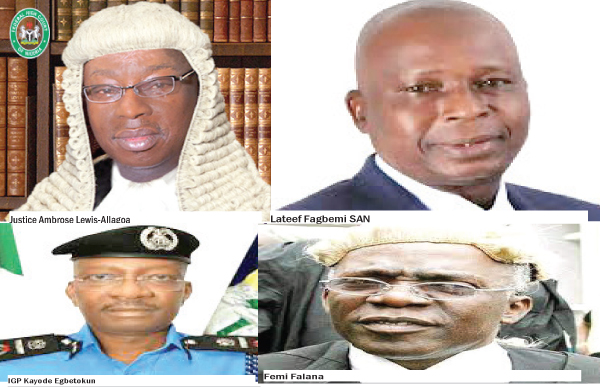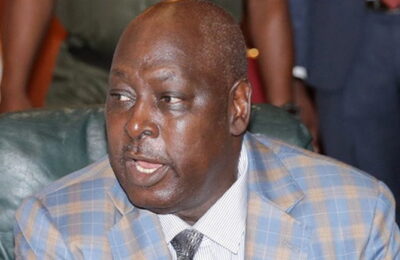The recent ruling of a Federal High Court sitting in Lagos, mandating the Federal Government to fix the prices of goods and petroleum products, has generated a lot of views. YEJIDE GBENGA-OGUNDARE harnesses all sides to the controversy.
When Justice Ambrose Lewis-Allagoa of the Federal High Court sitting in Lagos on Wednesday, February 7, gave an order that the Federal Government must fix the prices of goods and petroleum products within seven days, with specific order that government should fix the price of milk, flour, salt, sugar, bicycles, and their spare parts, matches, motorcycles and their spare parts, motor vehicles and their spare parts as well as petroleum products, which include diesel, Premium Motor Spirit and kerosene, many did not envisage the uproar that has been attending it, in diverse sectors of the economy and the Bar.
The court’s order, was in a judgment delivered in a suit delineated FHC/L/CS/869/2023, filed by popular rights lawyer, Femi Falana (SAN) against two defendants; the Price Control Board and the Attorney-General of the Federation.

Falana, in his suit, prayed the court for some declarations and orders.
He asked the court to determine whether by virtue of Section 4 of the Price Control Act., Price Control Board is carrying out its duty to impose a price on any goods that are of the kind specified in the First Schedule to the Price Control Act.
He further asked the court for a declaration that the failure or refusal of the Price Control Board and the Attorney-General of the Federation to fix the prices of bicycles and spare parts; flour; matches; milk; motorcycles and spare parts; motor vehicles and spare parts; salt; sugar and petroleum products including diesel, petrol motor spirit, and kerosene is illegal as it offends the provision of Section 4 of the Price Control Act, Cap., Laws of the Federation of Nigeria, 2004.

His motion on notice was premised on Section 4(1) of the Price Control Act, Laws of the Federation of Nigeria, 2004 and he made it clear to the court that defendants in the suit were served with the processes after filing in May 2023, but they refused and failed to file any response or counter to it.

Falana, in the supporting affidavit to the motion deposed to by a lawyer in his chambers, Taiwo E. Olawanle, stated that the Price Control Board, was established by the Price Control Act, and is saddled with the responsibility to fix a price on goods to stabilise the general price level, prevent the hoarding of goods, protect customers from exorbitant prices, among others, and urged the court to grant all the reliefs sought since there is no counter from the respondents.
He argued that the Price Control Act empowers the Price Control Board to fix the prices of the wide array of commodities listed above.
“Though the price of the commodities listed above is supposed to be imposed by the first respondent, the only petroleum products that are fixed to a certain amount are not being enforced. The situation in the market, with each passing day, is becoming unbearable for consumers as prices of goods keeps rising daily.
“Sellers are not always sincere as they are so desperate to make excessive profits at the expense of the buyers. Food prices which human beings should not be deprived of are on the high side due to lack of price fixing by the first defendant. And buyers are at the receiving end when the prices of goods are increased as they tend to suffer for it more,” he argued.
Concept of price control in Nigeria
In Nigeria, price control as a concept was introduced by the military administration, during the regime of General Olusegun Obasanjo in the 1970s. It is a government order that decides the maximum or minimum price to be charged for specified goods and services; it is usually used during periods of high inflation or socio-economic crisis, as is currently experienced in Nigeria. The minimum price is called price floors while the maximums are price ceilings. And while government is still fixing the price floor for wages and salaries in the form of minimum wage, price control has become alien in the society.
But in 2004, the civilian administration of President Olusegun Obasanjo reenacted the Price Control Act and set up Price Control Board but the law has remained largely ineffective and obscure, until the recent judgment by Justice Lewis-Allagoa.
Assistant Director, Press, Ministry of Industry, Trade and Investment, Adeyemo Felicia, said the price control department had been scrapped by the previous administration, adding that “the department is no longer in the ministry. It used to be a long time ago but it’s no longer with us. I don’t know exactly but it was removed from the ministry a long time ago.”
A global practice?
Price control is not a Nigerian thing. Indeed, other climes use the concept as confirmed by Hugh Rockoff, a Professor of Economics at Rutgers University and a research associate of the National Bureau of Economic Research, who has written extensively on banking and monetary history and the economics of war. He said “governments in the United States have fixed the price of gasoline, the rent on apartments in New York City, and the wage of unskilled labour, to name a few. At times, governments go beyond fixing specific prices and try to control the general level of prices, as was done in the United States during both world wars and the Korean War and by the Nixon administration from 1971 to 1973.”
Also, recently, in response to the growing demand for rent control in the United Kingdom, the Mayor of London, Sadiq Khan said, “Londoners re-elected me on a manifesto pledge to push for the powers to control rents and I will not stop advocating for this lifeline on their behalf. I am delivering on my promise to build a better, fairer, and more prosperous London by building more affordable homes in the capital and providing vital support to Londoners through the cost-of-living crisis. It’s about time the government did the same.”
Experts kick
Not a few defenders of neoliberalism have criticised the judgment, on the ground that Nigeria is a capitalist country, though, others who are in favour of the judgment pointed out that even the leading capitalist countries in the world regularly subsidise energy and gas and regulate the prices of certain goods and services.
Many analyses have been done on the effects of price control. It was argued that price control could lead to shortages of goods and services as producers may lose the incentive to produce at lower prices, leading to an influx of black markets and reduced investments and innovation in some sectors, since producers may not be willing to make huge investments if they cannot raise prices to recoup their investments.
Also, it is said that regulated prices of refined products are a major source of discouragement because it causes proliferation of fake products when original producers cannot produce at regulated prices. Some argue that this is one of the reasons that foreign investors shy away from investing in refineries in Nigeria.
In the Nigerian society, price control is deemed to be extremely difficult and costly to enforce because it will empower extortionists and bribe takers under the guise of enforcers and many skeptics hold the belief that reintroducing price control would be counterproductive and difficult to enforce, with unintended consequences.
There was another line of argument that if the Federal Government had diligently defended the matter and entered a defence, the judge might have given a different order. This may not be far from the truth as the Special Assistant on Communication and Publicity to the Attorney-General of the Federation, Kamarudeen Ogundele, after the judgement said, “As soon as we have a copy of the judgment, we will study it. On the long run, we will take a decision that is in the best interest of the country. Rest assured that this government will always have the interest of the masses at heart.”
Dr. Ogunsola Akintunde, an economic and financial analyst in an interview that there’s no feasibility that the government will obey court order to fix goods’ prices, adding that “in Nigeria, the court orders obeyed are usually chosen and especially within seven days, it doesn’t seem feasible for the government.”
OPS faults order
Organized private sector also faulted the order, arguing that the government could only fix prices for the services it renders. The chairman of the Nigerian Economic Summit Group, Niyi Yusuf, said government cannot fix prices as it would become a disincentive to production. He added that the situation underscores the need for the National Assembly to continually review the laws to ensure they reflect they are fit for purpose.
“Government can only fix price for services it renders or products it delivers. Government should not be fixing prices for products of entrepreneurs and enterprises as it will become a disincentive to production which may lead to many unintended consequences including scarcity of the products,” he noted.
The Director-General of the Manufacturers Association of Nigeria, Ajayi Kadiri, said the legislation on goods prices was practically impossible due to the macro-economy indications, reiterating that “the truth of it is that even though the prices of goods should be determined by legislation, however, there are so many macro-economy indications that make it practically impossible to pre-determine the prices of goods because there are other inter-plays that determine the prices of goods.”
Supporting his stand, oil marketers under the umbrella of the Independent Petroleum Marketers Association of Nigeria through its National Vice President, Hammed Fashola, also rejected the order, asserting that the government had deregulated the petroleum sector and can no longer fix the prices of petrol, kerosene, diesel and gas, arguing that it would amount to a double standard if the government made any attempt to regulate the prices of petroleum products.
The President, Nigerian Association of Chambers of Commerce, Industry, Mines, and Agriculture, Dele Oye, also described the judgment as unusual, saying, “It is very unusual for that kind of judgment, however, we do not know what the surrounding issue is, particularly why the court had to decree such an order, but issues on economy are not normal issues one takes to court.’’
Falana defends action
However, in defense of the suit and consequent judgment, Falana in a statement, berated legal practitioners who questioned the order of the Federal High Court which according to him, is in conformity with a subsisting written law, describing it as the height of hypocrisy, in view of the compulsory payment of practising fees and NBA Stamp, and having regard to the binding provisions of the 2023 Legal Practitioners Remuneration Order which has fixed the professional fees of legal practitioners.
In the statement titled, ‘How Price Control Law Applies To Legal Services In Nigeria,’ Falana said no profession is more regulated than the legal profession in Nigeria, notwithstanding that Nigeria operates a so-called free market economy. He added that it is interesting that the lawyers who have criticised the order of the Federal High Court, have not campaigned for the right to practice law without any form of regulatory interference.
He added that it is pertinent to review the laws that regulate prices and some of the decided cases on the regulation of the practice of law throughout the country, reiterating that “first, pursuant to section 8(2) of the Legal Practitioners Act, no legal practitioner shall be accorded the right of audience in any court in Nigeria in any year, unless he/she has paid, in respect of that year, the prescribed practising fee. Second, the Stamp and Seal produced and sold by the Nigerian Bar Association must be purchased and affixed on legal processes, legal documentation and legal correspondences.”
He noted that in several cases, Nigerian courts have upheld the legal validity of the compulsory payment of practising fees and the NBA stamp, adding that, “yet, apostles of neoliberalism in the legal profession have not challenged such judicial decisions on the grounds that they infringe on the fundamental right of every citizen to access the court for legal redress in accordance with section 36(1) of the Constitution.
“The 2023 Legal Practitioners Remuneration Order has regulated the prices charged for services by legal practitioners in Nigeria. Like the Price Control Act, the law covers the remuneration charged by legal practitioners for business, legal services and legal representation unlike the revoked order of 1991 which covered only remuneration for legal documentation and other land matters.
“The 2023 Legal Practitioners Remuneration Order contains four scales in the 1st schedule according to which a legal practitioner shall charge his/her legal fees as follows: a. Consultations and Legal Opinions – Scale 1; b. Incorporation or registration of companies and business names – Scale 2; c. Litigation – Scale 3 and .Property transactions – Scale 4
“While the law recognizes the right of lawyers to do pro bono legal services under the Legal Aid Act or for family members, it stipulates that any lawyer doing pro bono service on grounds of consanguinity or affinity shall submit to the Remuneration Committee an affidavit disclosing the facts and circumstances justifying the pro bono work.
“The provisions of the new Order are binding on all legal practitioners immediately after it came into effect on the 16th day of May 2023. The breach of the provisions of the new Order is professional misconduct. Lawyers are encouraged to report any breach of the new legislation to the Remuneration Committee. The Remuneration Committee shall investigate the reports and lodge a report to the Legal Practitioners Disciplinary Committee if a case of infraction of the new Order is established,” he added.
Government must obey–Ubani
A former Chairman of the Section of Public Interest and Development Law (SPIDEL) of the Nigerian Bar Association (NBA), Monday Ubani has also stated that the Federal Government must obey the Lagos Federal High Court order, adding that the regulation of the prices of goods by the government is the right thing to do.
Ubani an interview on Channels Television’s Sunrise Daily said, “The government must fix prices of goods. The court has now ordered within seven days. A government that is interested in making sure that the lives of people are better will intervene in this particular process and obey the court judgment and say let’s now begin to fix prices on items and that is the best thing for them to do.
“And I think that a government that loves Nigeria would do that. I don’t hope that they will go and appeal this particular judgment.”
While expressing regret that the failure of the government to fix the prices of goods and petroleum products is making sellers take undue advantage of consumers, he said “there was some level of government intervention in the prices of things in Nigeria. It got to a stage where the government did not in any way show interest in the issue of inflation, in the issue of price fixing and the law has always been there”.
How it can work
Etim Etim, an economist stated that state governments should establish some kind of food stamp programs in which governments buy basic items in large quantities and resell at reduced prices to the vulnerable members of the public. He also advocated that every household be encouraged to grow their own food crops and raise poultry, adding that every civil servant should be mandated to own a farm and Fridays should be declared work-free to enable them to go to their farms.
According to him, while Nigeria operates a free market economy, several laws have imposed a duty on the Federal Government and State Governments to regulate the prices of fuel, tickets for train and domestic air travels, schools fees paid in government colleges and tuition in tertiary institutions, water rates, electricity tariffs, telecom call rates, tolling fees paid by road users, land use charge, fees for land documentation, rents paid by tenants and wages paid to workers.
He added that it is interesting to note that the services provided by a number of professional bodies are fixed and controlled by law and “therefore, the order of the Federal High Court which directed the Federal Government to control the prices of essential commodities in Nigeria is in accordance with section 16 (1)(b) of the Constitution which has imposed a legal obligation on the Government to control “the national economy in such manner as to secure the maximum welfare, freedom and happiness of every citizen on the basis of social justice and equality of status and opportunity.”








